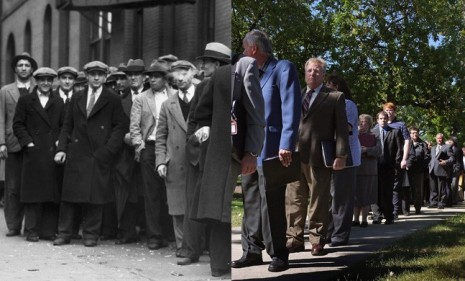Why the U.S. was better off in the Great Depression
Despite the mass poverty, the U.S. was quietly making tremendous progress in the 1930s, says David Leonhardt in The New York Times. Not this time

A free daily email with the biggest news stories of the day – and the best features from TheWeek.com
You are now subscribed
Your newsletter sign-up was successful
The Great Recession may have officially ended in June, but most people don't feel it. Household income is still dropping. Unemployment is stuck above 9 percent. And there's no end in sight, says David Leonhardt in The New York Times. Consider the Great Depression. People typically associate that era with broad suffering. But few today realize that the U.S. economy was actually revving up during the 1930s, and setting up a post-Depression era of dizzying growth. The current economic slump doesn't have that silver lining. In fact, if we don't right our ship or stumble onto the next growth engine, we might remember the Great Depression as the good times. Here, an excerpt:
Underneath the misery of the Great Depression, the United States economy was quietly making enormous strides during the 1930s. Television and nylon stockings were invented. Refrigerators and washing machines turned into mass-market products. Railroads became faster and roads smoother and wider....
It would clearly be nice if we could take some comfort from this bit of history. If anything, though, the lesson of the 1930s may be the opposite one. The most worrisome aspect about our current slump is that it combines obvious short-term problems — from the financial crisis — with less obvious long-term problems. Those long-term problems include a decade-long slowdown in new-business formation, the stagnation of educational gains and the rapid growth of industries with mixed blessings, including finance and health care.
The Week
Escape your echo chamber. Get the facts behind the news, plus analysis from multiple perspectives.

Sign up for The Week's Free Newsletters
From our morning news briefing to a weekly Good News Newsletter, get the best of The Week delivered directly to your inbox.
From our morning news briefing to a weekly Good News Newsletter, get the best of The Week delivered directly to your inbox.
Together, these problems raise the possibility that the United States is not merely suffering through a normal, if severe, downturn. Instead, it may have entered a phase in which high unemployment is the norm.
Read the entire article in The New York Times.
A free daily email with the biggest news stories of the day – and the best features from TheWeek.com
-
 Political cartoons for February 22
Political cartoons for February 22Cartoons Sunday’s political cartoons include Black history month, bloodsuckers, and more
-
 The mystery of flight MH370
The mystery of flight MH370The Explainer In 2014, the passenger plane vanished without trace. Twelve years on, a new operation is under way to find the wreckage of the doomed airliner
-
 5 royally funny cartoons about the former prince Andrew’s arrest
5 royally funny cartoons about the former prince Andrew’s arrestCartoons Artists take on falling from grace, kingly manners, and more